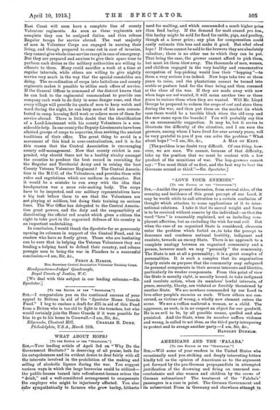"LOVE YOUR ENEMIES."
[To rue EDITOR or rex "Sreoraron.1 Sts,—Amidet the present discussion, from several sides, of the meaning and incidence of this great precept of our Lord, it may be worth while to call attention to a certain confusion of thought which attaches to some applications of it to inter- national relations. I take it that its sacred weight and force is to be received without reserve by the individual—so that the word "love" is reasonably explained, not as including com- placent affection, but as excluding the wish for real evil. But when the case of an organized State is considered, elements enter the problem which forbid us .to take the precept to denounce and condemn national hostility, indignant and resolute, towards an enemy State. There is no approach to a complete analogy between an organized community and a person, however much we may "personify" the community. The State is not at all a personality; it is a great complex of personalities. It is such a complex that its organization largely exists on purpose that the community may safeguard its personal components in their several interests and liberties. particularly ita weaker components. From this point of view the State is morally right, is morally bound, to take indignant and resolute action, when its members' lawful interests, of peace, security, liberty, are violated or forcibly threatened by another State. We are nowhere commanded by our Lord to love other people's enemies as such. Where others are con- cerned, as victims of wrong, a wholly new element enters the scene. We see a ruffian maltreat a woman, or a child. The aggressor, as such, is in no respect an object for our goodwill. He is an evil to be, by all possible means, quelled and also punished. And the State, when its member suffers violence and wrong, is called to act thus, as the third party interposing to protect and to avenge another party.—I am, Sir, dm.,
HANDLEY DONELM.






































 Previous page
Previous page